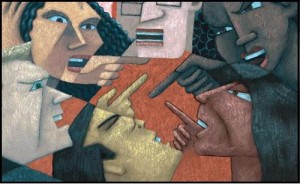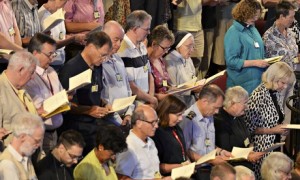
…care must be taken against excessive eating.
Why do we struggle so much to share?
There are statistics lining the internet about wealth distribution and figures which highlight the disparity between the wealthier parts of society and the poorer. Economic inequality has been a curse of humanity ever since man discovered the concept of possession.
Why do we struggle so much to share?
We have, built within us, a survival instinct which grows from experiences of lack. We experience hunger (for however long or short a time) and we remember that, at one point, we were unable, for whatever reason, to access basic sustenance. This sensation remains with us and we teach ourselves and our offspring that the world is ultimately a place of scarcity and we must fight for the resources available to us to stay alive.
Despite developed political systems and economic theories the thing the world is really scarce in is a system or idea which encourages a healthy and sustainable mutual sharing of resources. Our current politic, neoliberalism, is based on the premise that we, as citizens, must compete. Without market and competition our economy breaks. This political ideology forces us citizens to view ourselves as individual units who must interact with others through a ‘healthy’ exchange of goods and services within a competitive market place. This in turn forces politics to become synonymous with matters of money and wealth, which means that all conversations about how we should live together revolves around discussions about how to generate income and how to spend that income.
Politics began as the varying practices of rulers and kings in their control of their subjects. When governance became more complex at the dawning of empires, these practices began to be studied by those powerful people who were delegated power by the emperor and advised him/her on decisions relating to maintaining control of the kingdom. Aristotle’s exploration on the subject, outlines 6 main tasks for a state to concern itself: food supply, manufacture of tools, weapons and defence, creation of wealth/trade, ‘and of primary importance the supervision of religious matters, which is called the priesthood’ and finally, ‘the most necessary of all, judgement about what is beneficial and what is just in their relations with one another.’
In Aristotle’s outlining of ‘good’ politic, wealth was a minor issue. Indeed Aristotle’s understanding of economics, which we all immediately think is about finance, was actually more to do with the general ‘art of household management’ (the original root of the word oikonomikos: economics) of which money is mentioned as a mere tool to be used within the art of managing a household.
It is clear that household management [economics] is not the same as wealth acquisition, since the former uses resources, while the latter provides them (Aristotle, CDC Reeve (trans.), Politics (Indianapolis: Hackett Publishing Company, 1998)p. 13)
Aristotle suggests that a symptom of a sick or distorted politic or economy is one which overly focuses on wealth acquisition. He even goes as far as to say,
Hence usury is very justifiably detested, since it gets wealth from money itself, rather than from the very thing money was devised to facilitate. For money was introduced to facilitate exchange, but interest makes money itself grow bigger. (That is how it gets its name; for offspring resemble their parents, and interest is money that comes from money.) Hence of all the kinds of wealth acquisition this one is the most unnatural.(ibid., p.19)
Of course, Aristotle is just one person who has outlined a political theory and there are many others who disagree with some or all of his ideas. Aristotle’s book however, along with Plato’s ‘Republic’, is considered the first systematic framework for political thought and one which, in my opinion, is so thorough that all books after it can be considered as footnotes or developments.
With this in mind, I find it interesting that the father of political philosophy should diagnose an economy based on interest rates and discussions on wealth acquisition as ‘most unnatural’. It is also of interest to note the biblical view of economics and, particularly discussions on money. The Old Testament has strong things to say about ‘usury’,
If he has a son who is violent, a shedder of blood, who does any of these things (though his father does none of them), who eats upon the mountains, defiles his neighbour’s wife, oppresses the poor and needy, commits robbery, does not restore the pledge, lifts up his eyes to the idols, commits abomination, takes advance or accrued interest; shall he then live? He shall not. He has done all these abominable things; he shall surely die; his blood shall be upon himself. (Ezekiel 18:10-13) (my emphasis)
Jesus, repeatedly talks about money, not as something to ‘store up’, but something to be used to bless others. There is an interesting parable which seems to suggest that Jesus is stating that accruing interest is a godly thing,
As they were listening to this, he went on to tell a parable, because he was near Jerusalem, and because they supposed that the kingdom of God was to appear immediately. So he said, “A nobleman went to a distant country to get royal power for himself and then return. He summoned ten of his slaves, and gave them ten pounds, and said to them, ‘Do business with these until I come back.’ But the citizens of his country hated him and sent a delegation after him, saying, ‘We do not want this man to rule over us.’ When he returned, having received royal power, he ordered these slaves, to whom he had given the money, to be summoned so that he might find out what they had gained by trading. The first came forward and said, ‘Lord, your pound has made ten more pounds.’ He said to him, ‘Well done, good slave! Because you have been trustworthy in a very small thing, take charge of ten cities.’ Then the second came, saying, ‘Lord, your pound has made five pounds.’ He said to him, ‘And you, rule over five cities.’ Then the other came, saying, ‘Lord, here is your pound. I wrapped it up in a piece of cloth, for I was afraid of you, because you are a harsh man; you take what you did not deposit, and reap what you did not sow.’ He said to him, ‘I will judge you by your own words, you wicked slave! You knew, did you, that I was a harsh man, taking what I did not deposit and reaping what I did not sow? Why then did you not put my money into the bank? Then when I returned, I could have collected it with interest.’ He said to the bystanders, ‘Take the pound from him and give it to the one who has ten pounds.’ (And they said to him, ‘Lord, he has ten pounds!’) ‘I tell you, to all those who have, more will be given; but from those who have nothing, even what they have will be taken away. But as for these enemies of mine who did not want me to be king over them—bring them here and slaughter them in my presence.’” (Luke 19:11-27)
It is Walter Wink who famously challenges our traditional interpretation of this passage and, although I don’t follow his argument through to his conclusion exactly, I do agree with the questions he raises with the reading which is promoted in many Christian congregations. Wink’s argument begins by drawing out some verses which do not naturally ‘add up’. In the traditional interpretation of this passage the ‘nobleman’ is seen as the God-figure; if this is true then where is his ‘country’ of which the citizens ‘hated him’? Heaven or earth? If Heaven then the citizens are the angels and why are they described as hating God? If earth then where is the distant country of which also the citizens do not want him to rule over them?
This God-figure then becomes more sinister as we observe his interactions with the third slave: he is seen as a ‘harsh man, taking what I did not deposit and reaping what I did not sow’ then he gives to those that have more and those that have nothing (the poor) even more will be taken away. How do we square this God with the God of the poor? His response to the failure of this slave to produce interest on an investment is not to send him away to a place with gnashing teeth (the usual punishment in parables) but to have him brought back and slaughtered in his presence!
If we understand Jesus as being the proclaimer of ‘good news to the poor’ then how might we read this parable through the eyes of the poor? The nobleman becomes Caesar, or worldly rulers, who want to seize power, who want to reap where they have not sown, to make money without working (usury). The poor in the nobleman’s country rightfully hate him and those who he goes a conquers do not want to be oppressed likewise. When he comes back the third slave, instead of being a symbol of failure, becomes instead a protestor to the misuse of money, economics and politics. Jesus sides, in this interpretation as being on the side of the third slave and his punishment will be like that of the slave in the story; to be slaughtered in the presence of his accusers.
Jesus tells this cautionary tale on his way into Jerusalem where he will defy those who have the power of life and death over him, standing before Herod, Pilate and others who ‘reap what they do not sow’.(Chris Howson, A Just Church: 21st century Liberation Theology in Action (London: Continuum, 2011) p.39)
This interpretation then fits within a theology which denies the use of usury and unhealthy reliance on investment, which brings money back into a position of tool rather than possession. The Kingdom is described by Jesus’ words and actions as having a different economy and politic to that offered by the empires of this world. God’s economy is securely based on a view that the world is full of abundant gift not scarcity.
There is the promise throughout Scripture that God has created an economy in which there is enough, that God has not created a world of scarcity with too many people or too little stuff. As Gandhi said, “There’s enough for everyone’s need but not everyone’s greed.” We are to pray this day for our daily bread – nothing more and nothing less. (Shane Claiborne, Jonathan Wilson Hartgrove and Enuma Okoro, Common Prayer: a liturgy for Ordinary Radicals (Michigan: Zondervan, 2010) p.88)
Here, in the Rule of St. Benedict, we have the establishing of a practice which is based on a different economy to them one we are used to in the world. In this economy everyone is given enough; nothing more and nothing less. For the elderly, the young and the sick there is more given but the basic rule is that all will be fed. This economy relies on trust that God will provide our daily bread but also that we are to curb our desire for excess.
Reflection
The Kingdom of God has a distinct politic and economic system, one which challenges the world’s. It is easy to work within the Church (the embodiment of the Kingdom) using the theories and practices of the world when it comes to money and politics. We are called, however, to live God’s way in God’s economy but what a sign of God’s power and sovereignty if we lived in a world of abundance rather than scarcity.
Our reliance on interest, on savings and reserves is not only not ideal, it is actually contrary to the Kingdom of God. This view of money is one which is distorted by fear; fear of not having enough. Sure, there are congregations which struggle to make ends meet, with buildings requiring upkeep and heating to be maintained but the solution is not to seek more money but to ask what it is that God is giving you and to use that. What I mean is the focus of conversation is not looking at what’s missing but discerning what God has provided. This will require some challenging questions about the need for a large building, or on what the money is currently being spent on; maybe God wants you to redistribute the resources to other things and to stop us spending excessive amounts on particular projects.
The moment our conversations are solely about that which we don’t have the large the temptation to create it ‘unnaturally’. The problem of the austerity measures our current government (both the Coalition and parts of the Opposition) are promoting is not the practical outworkings but rather the basis altogether. It is far easier for us to change things to increase income than to ask the question of where are we being excessive? The disparity between the rich and the poor is solely rooted in the greed of our hearts and the system set up to encourage competition and private ownership.
We as the Church can preach the gospel by offering an alternative economy and politic and I for one want it to go beyond the Church; this, however, means we need to start living it in the Church.
Abundant God, you created the world teeming with life and called us to be stewards of its resources. You taught us the way to have enough for all and we’re truly sorry for the lack of care we have shown and our failure to fully grasp our shared responsibility over the world’s fruit. Grant us your wisdom to manage the many gifts you give us to build up the Body of Christ and to bring about your Kingdom in the world.
Come, Lord Jesus
 Who has the right to the land of Gaza and the West Bank? We could start by going into all the history and legalities over this issue. The use of words such as ownership can then be brought into question. Historical facts could then be muddied by interpretation of events and phrasings and then there’s the insurmountable obstacle of personal stories and the tangled web of historical violence from both sides.
Who has the right to the land of Gaza and the West Bank? We could start by going into all the history and legalities over this issue. The use of words such as ownership can then be brought into question. Historical facts could then be muddied by interpretation of events and phrasings and then there’s the insurmountable obstacle of personal stories and the tangled web of historical violence from both sides. Winning arguments is easy if you can just wear down your opponent and the easiest way to do that is keep moving the goal posts; re-define the terms of the argument until it gets too complicated and they get confused and worn out. You don’t need truth to do this; all you need is stamina and intelligence.
Winning arguments is easy if you can just wear down your opponent and the easiest way to do that is keep moving the goal posts; re-define the terms of the argument until it gets too complicated and they get confused and worn out. You don’t need truth to do this; all you need is stamina and intelligence. In November 2012 General Synod’s motion to vote female bishops failed, only just but enough. What was clear back then was that the debate had been established on the principle that there was an ‘us’ vs. ‘them’. The aim was not to discover wisdom but to ‘win’ at any cost. Both parties on the extremes didn’t seem to care how they would win just as long as they did. This week, however, the tone of the debate was not on winning points and persuasion but a genuine, heartfelt desire to seek wisdom and to trust one another. The debate stopped being about party politics but more about seeking genuine peace and wisdom only found in the Spirit of God.
In November 2012 General Synod’s motion to vote female bishops failed, only just but enough. What was clear back then was that the debate had been established on the principle that there was an ‘us’ vs. ‘them’. The aim was not to discover wisdom but to ‘win’ at any cost. Both parties on the extremes didn’t seem to care how they would win just as long as they did. This week, however, the tone of the debate was not on winning points and persuasion but a genuine, heartfelt desire to seek wisdom and to trust one another. The debate stopped being about party politics but more about seeking genuine peace and wisdom only found in the Spirit of God. To dismantle such a fence of division takes time, building trust and relationship something sadly lacking in our politics in this country. My very public critique of the Same Sex Marriage Bill was not based on some personal, moral judgement on homosexuality but on the way a decision was being sought. It was rushed. The lobbyists pressured opponents with the supposed lack of time and bullied people into making a response; to choose a side of the fence. Rather than taking the fences down they were happy to keep them there. People were forced off the fence onto one side or the other and it was all done by the manipulation of language. The same is being done with The Assisted Dying Bill.
To dismantle such a fence of division takes time, building trust and relationship something sadly lacking in our politics in this country. My very public critique of the Same Sex Marriage Bill was not based on some personal, moral judgement on homosexuality but on the way a decision was being sought. It was rushed. The lobbyists pressured opponents with the supposed lack of time and bullied people into making a response; to choose a side of the fence. Rather than taking the fences down they were happy to keep them there. People were forced off the fence onto one side or the other and it was all done by the manipulation of language. The same is being done with The Assisted Dying Bill.